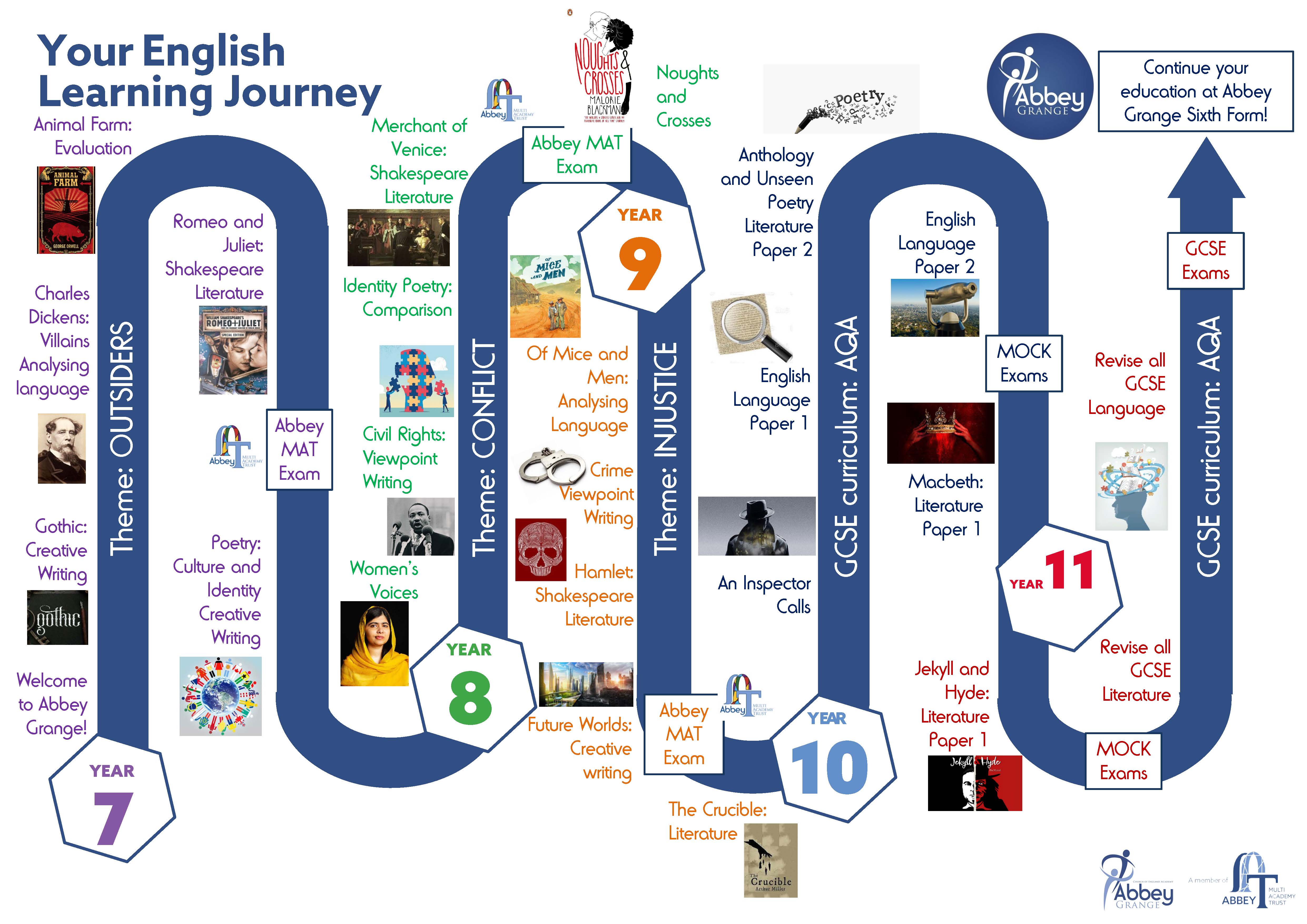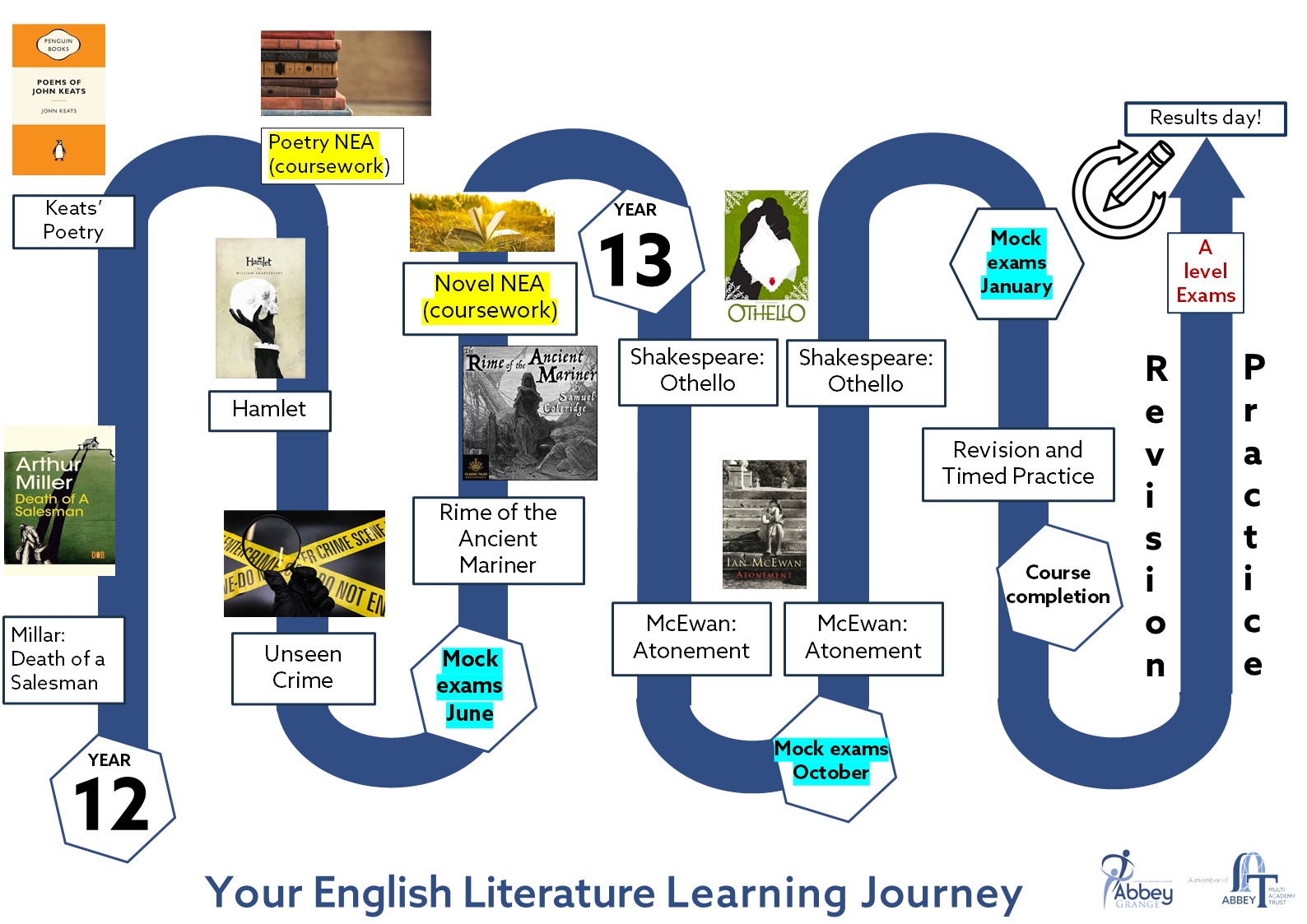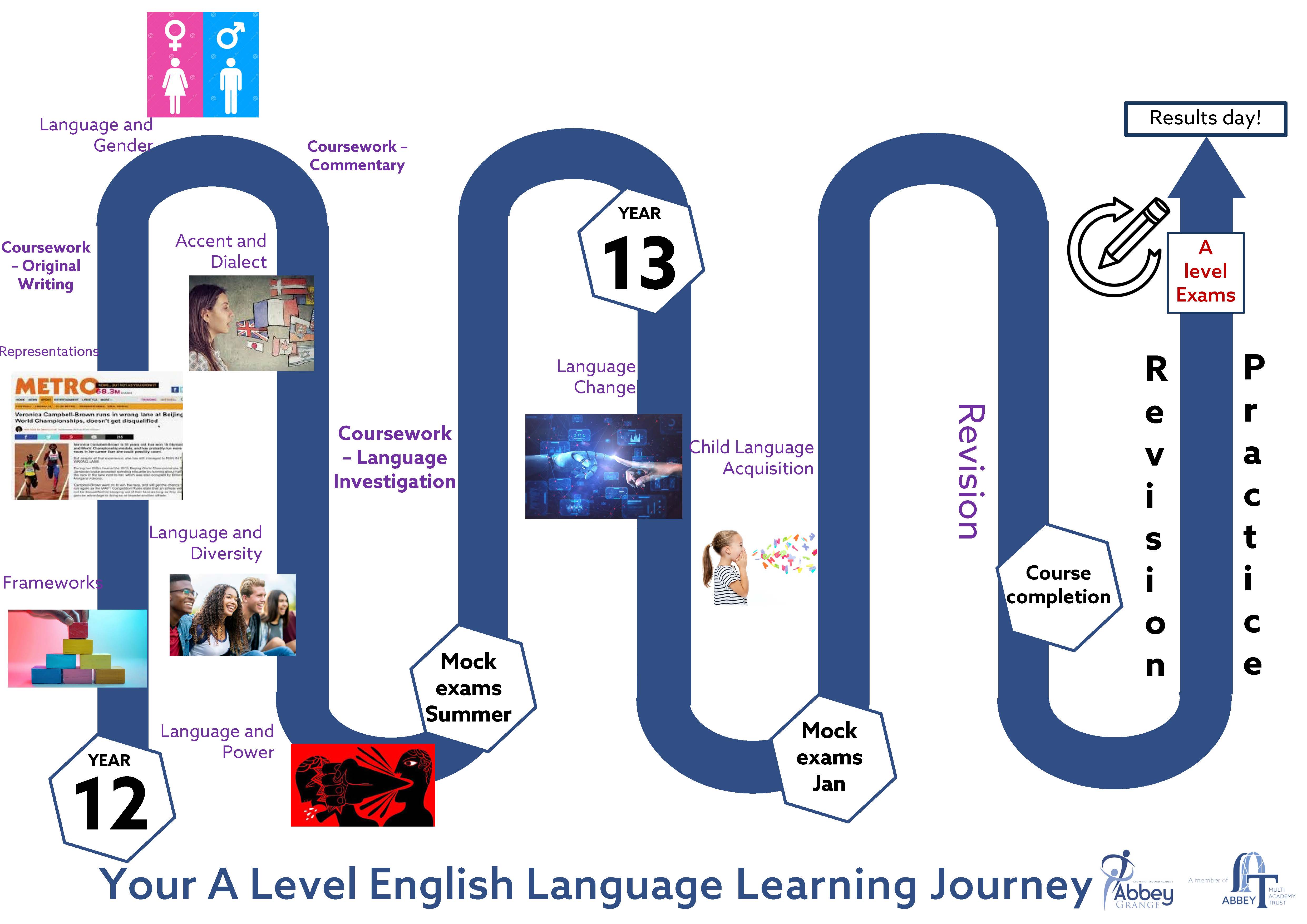
Our vision is to empower our young learners to be literate, articulate and confident communicators who can interpret and flourish in the world around them, appreciating the richness of diversity and identity so that they become well-rounded citizens. Our students engage in a broad and diverse Literature rich curriculum which challenges, encourages critical and independent thought, embeds a culture of creativity and inspires a lifelong love of reading.

Students will read a range of challenging and engaging texts, including novels, short stories, poetry, plays and non-fiction materials – from classic writers like Shakespeare and Dickens to more modern writers such as Simon Armitage and Susan Hill. Students will also write their own short stories, poems and non-fiction such as letters and opinion articles to entertain readers and communicate opinions. Allowing the chance to learn through talk is very important, so there will be many opportunities for students to develop speaking and listening skills through discussions and debates in class.
Students will learn in a supportive classroom, collaborating and challenging each other through peer discussion and reflection activities. Students will apply their knowledge every lesson and connecting their understanding to prior learning. Students will show benevolence towards each other as students discuss and take part in reading in class and listening to other viewpoints.
Discussions around challenging topics such as ‘outsiders’ in society, conflict and injustice ensures students will develop their understanding of benevolence and empathy through complex characters in challenging texts.
We promote excellence and aspiration through classic texts, such as Shakespeare plays in each year, Animal Farm, Dickens and The Crucible. Students will grapple with important themes that are still prevalent in society today.
The KS3 English curriculum introduces students to powerful questions about self, others, beauty, and God through a diverse range of texts. In Gothic literature, students explore fear, identity, and inner darkness—asking what lurks within the self and how beauty can mask horror. Studying a variety of Dickens’ texts raises questions about poverty, justice, and moral growth—challenging students to consider their responsibility to others. Animal Farm and dystopian literature provoke reflection on power, truth, and individual freedom. In Romeo and Juliet and The Merchant of Venice, students question love, prejudice, and the consequences of loyalty or revenge. Hamlet probes deep into self-doubt, mortality, and the soul’s search for truth. The Crucible and civil rights texts prompt questions about belief, justice, and standing up to oppression. Of Mice and Men explores loneliness, dreams, and the human need for connection and dignity.
Across these texts, students are invited to ask:
• Who am I, and what drives my choices?
• How should I treat those different from me?
• Can beauty be true, or is it deceiving?
• Is there justice beyond the law — something divine or moral?
These explorations help students develop empathy, ethical awareness, and deeper insight into the human condition. The KS3 English curriculum helps students explore questions about God's role in justice, suffering, and human behaviour. It encourages reflection on faith, morality, divine punishment, forgiveness, and the search for meaning. Students consider whether a higher power guides actions, offers hope, or is absent in times of injustice and struggle.
Students will be formatively assessed weekly through class discussions, ‘apply and demonstrate’ tasks, peer and self-assessment and whole class teacher feedback. Students will reflect on their own work and their peers and act on feedback. Students will complete summative assessments at the end of each topic which will be assessed and tracked. Students will REACT in detail to improve their work through redrafting and editing ensuring visible progress.
Reading skills will be assessed through close analysis of parts of the text (eg novel or poem) to check understanding of the main ideas and how the writer communicates through language choices.
Writing is assessed by opportunities to write creatively (such as gothic horror stories), to write their own poems and opinion articles. Students will be tested on their ability to meet the needs of the audience, to use specific skills suitable to certain types of writing and to be accurate with their spelling, punctuation and sentences.
At the end of each year, students will sit an exam in a formal setting so they can have experience of an exam setting.
Students will have to study English at KS4 – and this is because it is absolutely essential in developing well-rounded, articulate and thoughtful young people. GCSE builds on their KS3 experience so that they continue to develop communication skills, both written and verbal.
At Abbey Grange we use the AQA specification for both English Literature and English Language.
To ensure a variety of experience across Years 10 and Year 11, we alternate between both GCSEs across the year. For GCSE Literature, students will study An Inspector Calls, Power and Conflict cluster of poetry, Macbeth and Jekyll and Hyde. Students will annotate in their own copies of these texts, exploring the themes, characters and writer’s aims.
We will also prepare students for the English Language GCSE by explicit teaching of individual question styles and past papers. Students will prepare a range of writing from narrative to transactional pieces focusing on the appropriate formality, creative language devices and structural features to create an interesting and engaging piece of writing.
The English AQA GCSE curriculum fosters aspiration by challenging students with diverse texts that inspire high academic goals, while building belief through encouraging confident expression of individual ideas and interpretations. It promotes benevolence by exploring themes of empathy and social justice, nurturing understanding and kindness, and supports excellence through rigorous skill development in analysis, writing, and exam techniques. Additionally, the curriculum cultivates youth leadership by offering opportunities for students to lead discussions, mentor peers and empowering them to take ownership of their learning and positively influence others.
GCSE English Language and Literature encourages students to explore deep questions about identity, morality, and humanity.
An Inspector Calls prompts reflection on personal responsibility and social justice. Power and Conflict Poetry explores identity in the face of war, the cost of power, and the search for meaning amid suffering. Macbeth examines ambition, fate, guilt, and moral corruption. Jekyll and Hyde delves into duality, hidden evil, and the struggle between societal expectations and inner truth. Across all texts, students consider what defines self, God’s role in suffering, justice, redemption and fate, how we treat others, where true beauty lies, and whether divine justice or fate governs human behaviour and conscience.
Students will be formatively assessed weekly through class discussions, ‘apply and demonstrate’ tasks, peer and self-assessment and whole class teacher feedback. Students will reflect on their own work and their peers and act on feedback. Students will complete summative past paper assessments at the end of each topic which will be assessed and tracked. Students will REACT in detail to improve their work through redrafting and editing ensuring visible progress.
Students will be assessed in exam conditions such as both open and closed book assessments to prepare them for future GCSE exams. Mock examinations also take place at 3 points across KS4 to prepare students for longer periods of writing.
Studying GCSE English is beneficial for A Level and future careers because it builds essential skills in critical thinking, clear communication, and analytical writing. These skills form a strong foundation for the more advanced study required at A Level and are highly valued in many careers, helping individuals to express ideas effectively, solve problems, and engage confidently in a wide range of professional and academic contexts.
We offer AQA A Level for English Language, English Literature.
For A level English Literature, students will study a range of texts that are related to crime (including Atonement, The Rime of the Ancient Mariner, and Hamlet) and texts within the tragedy genre (Othello, Death of a Salesman and the poetry of John Keats). Students will annotate in their own copies of these texts, exploring the themes, characters and writer’s aims within their relevant genre.

For A level English Language, students will explore how texts use language to represent different issues and ideas in a range of contexts. Students will also take more of a sociolinguistic approach to English Language, covering topics such as accent and dialect, gender, technology and political correctness. Students will critically explore the different uses of language in the ‘real world’ and the important implications our language – and attitudes towards it – can have.

Across each of these A levels, students will develop a strong, critical voice and be expected to develop their views and perspectives through regular class discussions and debates. With typically smaller class sizes, students are encouraged to challenge and explore multiple interpretations within each lesson and will develop the confidence to orate their views articulately.
Studying AQA A Level English Language and Literature develops key personal and leadership skills by encouraging aspiration through exposure to diverse ideas and building belief through confidence in critical thinking and expression. It fosters benevolence by promoting empathy and ethical awareness through literature, and drives excellence through rigorous analysis, creativity, and high standards of communication. The course also nurtures youth leadership by developing skills in debate, collaboration, and independent inquiry, empowering students to lead with insight and integrity.
In AQA English Language A Level, students explore how language shapes identity, relationships, society, and belief, prompting deep questions about self, others, beauty, and God. Through the study of language and identity, students ask: Who am I? and How do my words reflect or shape who I become? They examine how language varies across age, gender, class, and culture, prompting reflection on how we present ourselves and are perceived by others.
In exploring others, students analyse power, politeness, and representation—asking: How do we include or exclude others through language? and What does language reveal about attitudes, bias, and empathy? In studying child language development, they consider how we form relationships and meaning from our earliest words.
Questions of beauty arise in analysing crafted speech and writing—how rhythm, metaphor, or structure create emotional or aesthetic impact. Students explore what makes language powerful or moving, and how beauty can persuade or inspire.
While the curriculum doesn’t focus explicitly on God, questions of belief, morality, and meaning surface in discourse analysis—particularly in political, religious, or philosophical texts. Students consider how language expresses faith, constructs truth, and reflects our search for understanding in both sacred and secular contexts.
The AQA English Literature A Level curriculum invites students to explore profound questions about self, others, beauty, and God through texts like Death of a Salesman, Keats’ poetry, The Rime of the Ancient Mariner, Othello, Hamlet, and Atonement.
Questions of self arise in Death of a Salesman and Hamlet, as characters struggle with identity, failure, self-deception, and the desire for meaning. Students consider: Who am I beneath expectation and performance? Can I shape my own destiny? In Othello, identity is challenged by race, jealousy, and manipulation.
In terms of others, these texts examine betrayal, love, guilt, and forgiveness. Atonement explores the impact of one action on many lives, prompting the question: Can we truly atone? Students ask: How do our choices affect others, and what do we owe them?
Beauty is central to Keats, who finds it in nature, art, and the eternal, yet also in transience and decay. Students consider: Is beauty truth, as Keats suggests? Can beauty survive suffering?
Ideas about God appear in The Rime of the Ancient Mariner, with its themes of sin, punishment, and redemption. Students explore: Is there divine justice? Can grace or forgiveness transcend human error?
Students will be formatively assessed weekly through class discussions, ‘apply and demonstrate’ tasks, peer and self assessment and whole class teacher feedback. Students will reflect on their own work and their peers and act on feedback. Students will complete summative past paper assessments at the end of each topic which will be assessed and tracked. Students will REACT in detail to improve their work through redrafting and editing ensuring visible progress.
Students will be assessed in exam conditions such as both open and closed book assessments to prepare them for future A Level exams. Mock examinations also take place at 3 points across KS5 (once in year 12 and twice in year 13) to prepare students for the demands of A level examinations.
Furthermore, all three A levels also feature a non-exam assessment (coursework) which allows students to interpedently plan, write and review their pieces of work. For A level English Literature and A level English Language, coursework accounts for 20% of the final grade. Through the NEA tasks, students are encouraged to further explore areas of the course that most interest them with much more freedom.
Studying one of these A levels will position students well for university courses such as journalism, linguistics or publishing, however the skills developed across the two years of study are transferrable to a vast array of different fields. By developing their writing proficiency, strong communication skills and establishing a strong analytical voice,
English make students highly attractive to STEM subjects also.